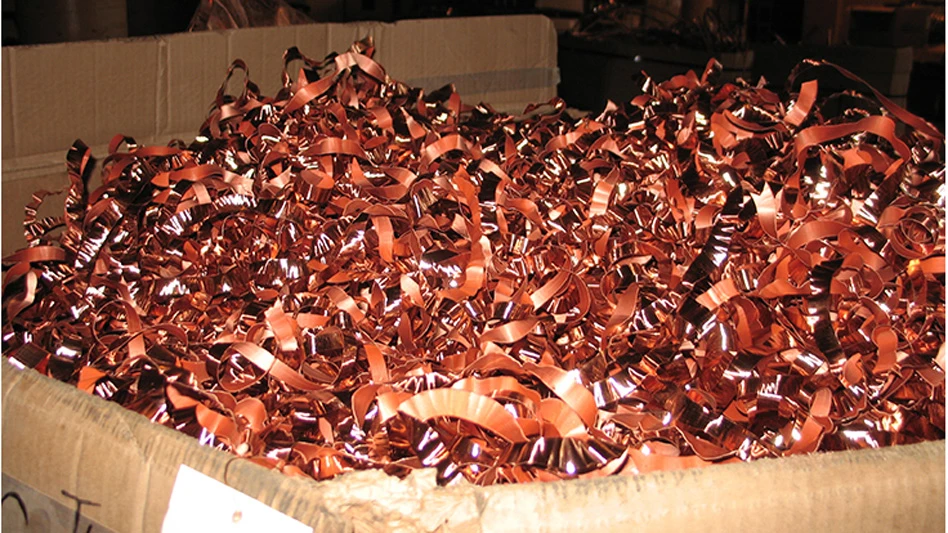While it’s not necessarily an easy road to travel, recycled plastics increasingly are being used in automotive applications, according to sessions at ISRI2017, the annual convention of the Washington-based Institute of Scrap Recycling Industries (ISRI), which was April 22-27 in New Orleans.
Sue Kozora, director of advanced engineering, North America, at International Automotive Components (IAC), Southfield, Michigan, said there are no shortcuts when it comes to using recycled plastics, which she likes to refer to as “experienced resins,” in automotive applications.

IAC provides interior parts to automotive original equipment manufacturers (OEMs) made in part from postindustrial recycled content. The company consumes 53.3 million pounds of recycled plastics annually, with its own scrap accounting for 17 million pounds of that figure. Ethylene vinyl acetate (EVA) makes up 9.4 million pounds of the recycled plastics it uses, while at 5.5 million tons polypropylene (PP) is the next largest recycled resin IAC consumes, followed by polycarbonate/acrylonitrile butadiene styrene (PC/ABS) at 5 million pounds.
OEM specifications, expectations and targets vary widely for recycled plastics, and OEMs require the same level of multilot statistical data for recycled materials as they do for virgin plastics, Kozora said. OEMs may use the same specifications for virgin plastics, or they may use specifications specific to recycled materials.
She added that OEMs “usually” expect recycled plastics to cost less than virgin plastics, even if they perform the same. On average, she said, OEMs expect recycled plastics to be 10 to 50 percent less expensive than virgin plastics.
While Kozora said recycled plastics can conform to automotive industry standards and have been used for decades, she added that a stigma persists, a sentiment that was echoed by other speakers during ISRI2017.
“Part of the problem with plastics is the perception that recycled material has inferior quality.” – Eric Connell, Toyota Motor Corp., Dexter, Michigan
Eric Connell, senior engineer for Toyota Motor Corp., who is based in Dexter, Michigan, said the perception lingers that recycled materials are not suitable for use in safety parts. “Part of the problem with plastics is the perception that recycled material has inferior quality.”
He said Toyota needs “lot-to-lot consistency” in the recycled plastics it uses. “Many recycled resin compounders cannot meet lot-to-lot variability targets.
“Cost is also an issue,” Connell added. “The delta is not enough to get people to take the plunge.”
Derek Reed, senior resin sales executive for Padnos, Wyoming, Michigan, said automotive OEMs largely are looking for cost savings when purchasing recycled resins to use in place of virgin plastics.
He said use of recycled plastics in automotive applications requires getting the support of molders, Tier 1 suppliers and OEMs, in particular securing buy-in from their engineering and purchasing departments.
“Having automotive approval means your material meets specification,” Reed said. “Parts suppliers can’t use your product without this approval.”
Factors such as weight and density also contribute to whether automakers can incorporate recycled plastics in their vehicles. Connell provided information on Toyota’s attempt to use recycled PP in a hidden interior part. While he said “a lot of recycled material is available,” the company decided not to incorporate it into the part because it increased its mass by 7 percent. “Black material had a higher density because of the additional carbon” used to color it. Increasing mass is against Toyota policy, however, so it did not pursue using recycled content in this application.
Toyota does not have a separate specification for the recycled resins it uses, Connell said. If the company can find recycled plastics that meet its specs and master color requirements and that have the same properties for tooling compatibility from suppliers that can manage material variability from lot to lot and deliver strong and consistent supply, then recycled plastics can be used.
“Having automotive approval means your material meets specification. Parts suppliers can’t use your product without this approval.” – Derek Reed, Padnos, Wyoming, Michigan
Sassan Tarahomi, director of R&D and process engineering at Mitsubishi Chemical Performance Polymers Inc., based in the Detroit area, agreed that the use of recycled resins in autos is governed by performance, cost and density issues.
Sponsored Content
Still relying on manual sorters?
Let AI do the heavy lifting. Waste Robotics delivers reliable, high-performance robots tailored for complex waste streams. They require minimal maintenance, are easy to operate, and are designed to boost your recovery rates. Smarter sorting starts with the right partner. Waste Expo Booth #1969 & REMA #2843
Click here to see our robots in action!He also suggested that mandates for the use of recycled plastic in cars are needed to push further progress in this area.
Tarahomi said automotive OEMs and their Tier 1 suppliers must do a better job designing plastic parts for disassembly and avoiding using dissimilar materials in the same assemblies.
Kozora said recycled plastics likely won’t totally replace virgin plastics in automotive applications, adding that the materials must responsibly coexist. While finding reliable, consistent supplies of some recycled plastics can be challenging, she noted that virgin materials are not necessarily worry-free, noting that her company has experienced a number of force majeure determinations affecting supply in her professional lifetime.
From an engineering standpoint, Kozora said it was important to design for recycling as well as for using recycled material.
Get curated news on YOUR industry.
Enter your email to receive our newsletters.

Explore the June 2017 Issue
Check out more from this issue and find your next story to read.
Latest from Recycling Today
- Nexwaste acquires 3 Texas businesses
- Maryland EPR bill awaits signature
- ABTC sells Fernley, Nevada, property
- Aqua Metals developing LFP recycling process
- RMR ceases shredding operations in Newport, Kentucky
- Bluewater streamlines solar panel replacement, recycling in Bermuda
- Steve Levetan to receive ReMA Lifetime Achievement Award
- ReMA, Germany’s VDM issue joint tariff statement








